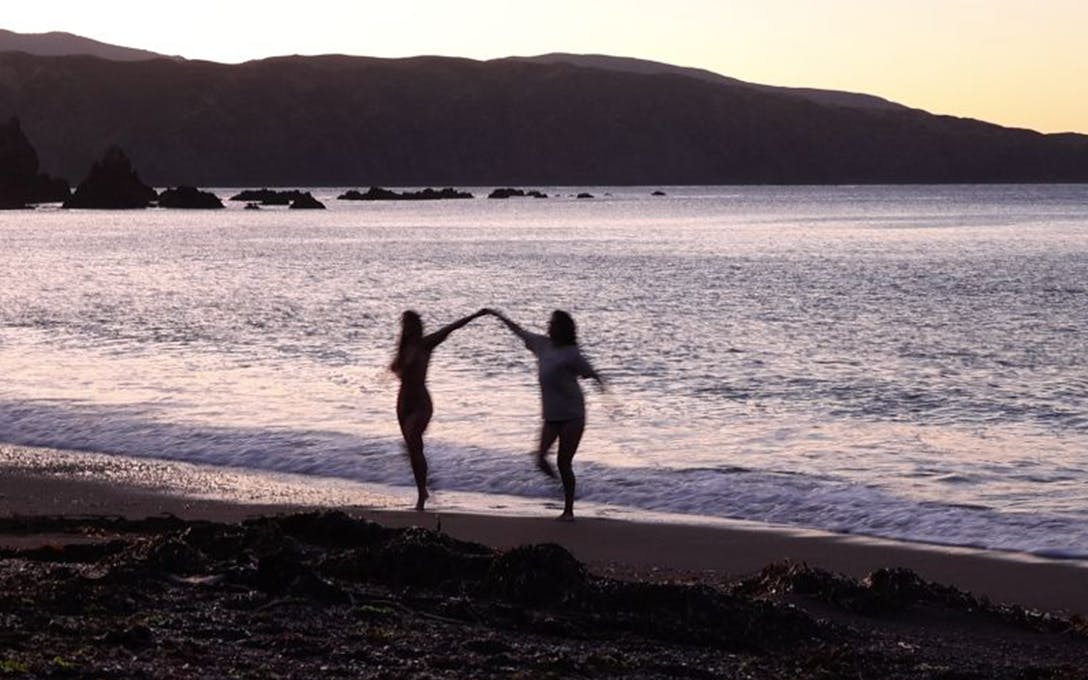


Hiraeth is a Welsh word describing a spiritual longing for a place that we have never been. The lost ancient places we imagine our ancestors would stomp their feet into their lands, it is the grief we struggle to locate in our bodies, a dislocated homesickness for a motherland we have never belonged to. The offerings of this exhibition illustrate our intimate and awkward rituals of becoming truly Pākehā—tangata Tiriti on our haerenga towards becoming familiar with the layers of our cultural identities and realities, on this whenua and in relation to its people.
Holly Walker and Sylvan Spring have collaborated on a video work ritualising a cèilidh, a Scottish and Irish dance tradition. The embodied performance of cèilidh connects us through movement to our whakapapa, whilst demonstrating the foreign disconnect we feel as Pākehā. This work steps towards untangling our inherited colonial individualism and severance from our cultural ancestry by loving and recognising one another, healing together and finding humble joys in the therapeutic practices of ancestral accountability and responsibility. The dances featured in the video are the Gay Gordons from Scotland, the Waves of Tory from Ireland, and Cylch y Cymru from Wales.
Walker has contributed a collection of photographic works which document an endurance practice of navigating landscapes in Te Ika-a-Māui with a concrete found object in the shape of an ‘I’. This series pushed her to further explore her relationship to the institution of settler colonialism and Pākehā identity. The work acknowledges and embraces the paradox of always belonging to both of these cultural identities. Walker carries the weight of her ‘I’ with her, through deserts and construction sites—an uncomfortable assertion in the environment, while a necessary attachment and weight to bear.
The video work is accompanied by a soundscape which combines field recordings, acoustic and software instruments, ancestral and modern sounds to deepen a sense of embodied connection to the work. Within the soundscape, Spring sings a traditional Irish song called ‘Óró, sé do bheatha ‘bhaile’, which was used prominently by the Irish people during both the Jacobite rising of 1745 and the Easter rising of 1916, as a protest song opposing their ongoing colonisation by the English.
Ngā mihi ki a Fraser Walker who filmed and edited Cèilidh, 2024, and Nayte who photographed I, 2024.
Sylvan Spring
Sylvan Spring is a Pākehā (Eire, Alba, England, Deutschland) writer and occasional music maker who has been shaped by the lands and waters of Te Whanganui-ā-Tara and Te Awakairangi. Their first book of poetry Killer Rack was just released this February through Te Herenga Waka University Press.
Holly Walker
I tipu ake au i Te Puke. Kei te noho au ki Pōneke ināinei. He Pākehā ahau, he Tangata Tiriti ahau, ko Holly tōku ingoa. Holly Walker is a multimedia artist, recently practicing in performance, photography, sculpture, video and written works. Holly’s work subjects her body as a performative foundation to explore and represent politics of identity.
Hiraeth is a Welsh word describing a spiritual longing for a place that we have never been. The lost ancient places we imagine our ancestors would stomp their feet into their lands, it is the grief we struggle to locate in our bodies, a dislocated homesickness for a motherland we have never belonged to. The offerings of this exhibition illustrate our intimate and awkward rituals of becoming truly Pākehā—tangata Tiriti on our haerenga towards becoming familiar with the layers of our cultural identities and realities, on this whenua and in relation to its people.
Holly Walker and Sylvan Spring have collaborated on a video work ritualising a cèilidh, a Scottish and Irish dance tradition. The embodied performance of cèilidh connects us through movement to our whakapapa, whilst demonstrating the foreign disconnect we feel as Pākehā. This work steps towards untangling our inherited colonial individualism and severance from our cultural ancestry by loving and recognising one another, healing together and finding humble joys in the therapeutic practices of ancestral accountability and responsibility. The dances featured in the video are the Gay Gordons from Scotland, the Waves of Tory from Ireland, and Cylch y Cymru from Wales.
Walker has contributed a collection of photographic works which document an endurance practice of navigating landscapes in Te Ika-a-Māui with a concrete found object in the shape of an ‘I’. This series pushed her to further explore her relationship to the institution of settler colonialism and Pākehā identity. The work acknowledges and embraces the paradox of always belonging to both of these cultural identities. Walker carries the weight of her ‘I’ with her, through deserts and construction sites—an uncomfortable assertion in the environment, while a necessary attachment and weight to bear.
The video work is accompanied by a soundscape which combines field recordings, acoustic and software instruments, ancestral and modern sounds to deepen a sense of embodied connection to the work. Within the soundscape, Spring sings a traditional Irish song called ‘Óró, sé do bheatha ‘bhaile’, which was used prominently by the Irish people during both the Jacobite rising of 1745 and the Easter rising of 1916, as a protest song opposing their ongoing colonisation by the English.
Ngā mihi ki a Fraser Walker who filmed and edited Cèilidh, 2024, and Nayte who photographed I, 2024.
Sylvan Spring
Sylvan Spring is a Pākehā (Eire, Alba, England, Deutschland) writer and occasional music maker who has been shaped by the lands and waters of Te Whanganui-ā-Tara and Te Awakairangi. Their first book of poetry Killer Rack was just released this February through Te Herenga Waka University Press.
Holly Walker
I tipu ake au i Te Puke. Kei te noho au ki Pōneke ināinei. He Pākehā ahau, he Tangata Tiriti ahau, ko Holly tōku ingoa. Holly Walker is a multimedia artist, recently practicing in performance, photography, sculpture, video and written works. Holly’s work subjects her body as a performative foundation to explore and represent politics of identity.